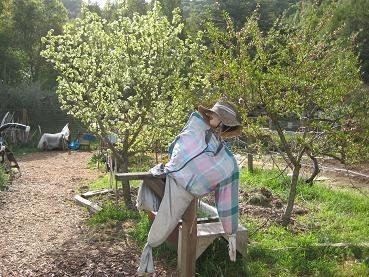In addition to being an organic farm, Hidden Villa spends much of the school year providing educational programs to elementary school children. The entire second grade for my daughters' school visited Hidden Villa this week, participating in their Farm and Wilderness Exploration program, which provided an open and honest look at real organic farming and food cycles. When we arrived, I was immediately taken with the serenity and beauty of the place, and, after a day's visit, impressed with the depth and diversity of the curriculum as well.

On our tour, we met pigs, cows, goats, sheep, and chickens and learned not only what they eat and how they live, but also what people use them for. When we visited the pig sty, the kids were all able to pet the pigs and see them eat (with a lot of oohing and aahing about how cute they were), but this wasn't just a petting-zoo experience. After we interacted with the pigs, we were directed to a learning center outside the sty where Susan, our guide, led a discussion on the many things people make from pigs. In addition to the obvious chat about ham and pork chops, Susan showed the children a dog chew made out of pig skin, marshmallows made from gelatin (which I hate to admit has pig collagen in it), a fancy hair brush with bristles made of pig hair, and a leather water pouch made of pig skin. She also told the kids that Hidden Villa slaughters some of their pigs and that using the animals is part of what happens on a working farm. The information was straightforward, yet age-appropriate, and the kids accepted it very maturely, and made some thoughtful comments of their own.

Our tour also included an expedition to Hidden Villa's extensive vegetable gardens and green house. In the composting area, the children were given shovels to help a little with the farm work, while we talked about growing seasons and fertilization. We then wandered through the vegetable beds, where Susan pulled sorrel leaves, rhubarb spears, and herbs to make "burritos" of all the vegetables wrapped in lettuce for the kids. Not one child moaned about hating vegetables. Everyone was eager to taste the burritos and exclaimed how much they loved them. One of my daughters has been begging me to grow sorrel since we've returned home.

After our farm visit, we wandered into the wilderness area, which is the largest part of Hidden Villa, for a hike that included discussions on plant communities, food webs, predator and prey relationships, and good stewardship of the land in a friendly and accessible way. Susan taught the kids how to make face paint by rubbing river rocks together and sent each child on a short (and safe) hike alone to reflect on the individual aspects of the forest and the surrounding area. When I asked my daughters and a friend of theirs what they liked the most about the trip to Hidden Villa, they shouted "the hike!" – with all three mentioning the solo walk as the best part of their day.
The Farm and Wilderness educational program at Hidden Villa is meant for 2nd – 6th graders, with tours every Tuesday through Friday. They also have farm tours, which are shorter and don't include the wilderness hike, for Pre-K through 1st graders. Weekend tours are available for families. During the summer months, Hidden Villa emphasizes the Duveneck family's commitment for nurturing relationships between people of different cultural, religious, economic and racial backgrounds through their summer camp program. Both day and overnight camps are offered, always with an emphasis on caring for each other and the environment.
If you live on the Peninsula, you're close enough to participate in Hidden Villa's Community Supported Agriculture (CSA) program, which allows you to purchase a share of the harvest at the beginning of the season, and then receive a basket of vegetables once a week from May until Thanksgiving. Hidden Villa participates in this program so people can get to know the farmers who grow their food and visit the land that produces it.



